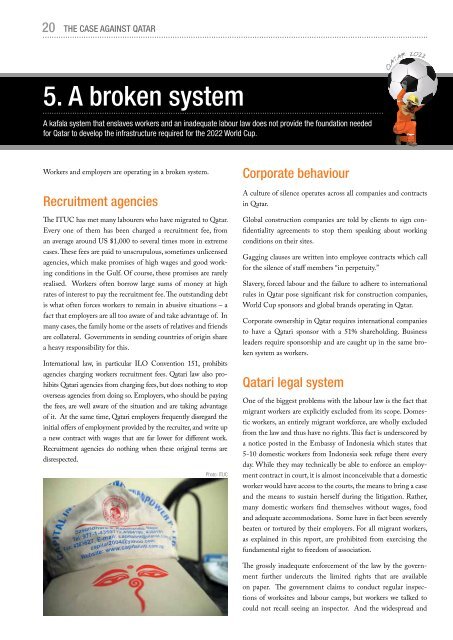11t5l
11t5l
11t5l
Create successful ePaper yourself
Turn your PDF publications into a flip-book with our unique Google optimized e-Paper software.
20 THE CASE AGAINST QATAR5. A broken systemA kafala system that enslaves workers and an inadequate labour law does not provide the foundation neededfor Qatar to develop the infrastructure required for the 2022 World Cup.Workers and employers are operating in a broken system.Recruitment agenciesThe ITUC has met many labourers who have migrated to Qatar.Every one of them has been charged a recruitment fee, froman average around US $1,000 to several times more in extremecases. These fees are paid to unscrupulous, sometimes unlicensedagencies, which make promises of high wages and good workingconditions in the Gulf. Of course, these promises are rarelyrealised. Workers often borrow large sums of money at highrates of interest to pay the recruitment fee. The outstanding debtis what often forces workers to remain in abusive situations – afact that employers are all too aware of and take advantage of. Inmany cases, the family home or the assets of relatives and friendsare collateral. Governments in sending countries of origin sharea heavy responsibility for this.International law, in particular ILO Convention 151, prohibitsagencies charging workers recruitment fees. Qatari law also prohibitsQatari agencies from charging fees, but does nothing to stopoverseas agencies from doing so. Employers, who should be payingthe fees, are well aware of the situation and are taking advantageof it. At the same time, Qatari employers frequently disregard theinitial offers of employment provided by the recruiter, and write upa new contract with wages that are far lower for different work.Recruitment agencies do nothing when these original terms aredisrespected.Photo: ITUCCorporate behaviourA culture of silence operates across all companies and contractsin Qatar.Global construction companies are told by clients to sign confidentialityagreements to stop them speaking about workingconditions on their sites.Gagging clauses are written into employee contracts which callfor the silence of staff members “in perpetuity.”Slavery, forced labour and the failure to adhere to internationalrules in Qatar pose significant risk for construction companies,World Cup sponsors and global brands operating in Qatar.Corporate ownership in Qatar requires international companiesto have a Qatari sponsor with a 51% shareholding. Businessleaders require sponsorship and are caught up in the same brokensystem as workers.Qatari legal systemOne of the biggest problems with the labour law is the fact thatmigrant workers are explicitly excluded from its scope. Domesticworkers, an entirely migrant workforce, are wholly excludedfrom the law and thus have no rights. This fact is underscored bya notice posted in the Embassy of Indonesia which states that5-10 domestic workers from Indonesia seek refuge there everyday. While they may technically be able to enforce an employmentcontract in court, it is almost inconceivable that a domesticworker would have access to the courts, the means to bring a caseand the means to sustain herself during the litigation. Rather,many domestic workers find themselves without wages, foodand adequate accommodations. Some have in fact been severelybeaten or tortured by their employers. For all migrant workers,as explained in this report, are prohibited from exercising thefundamental right to freedom of association.The grossly inadequate enforcement of the law by the governmentfurther undercuts the limited rights that are availableon paper. The government claims to conduct regular inspectionsof worksites and labour camps, but workers we talked tocould not recall seeing an inspector. And the widespread and


